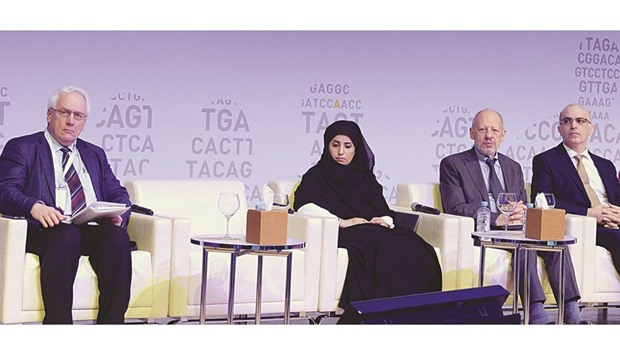Discussions about the field of biomedical science and the growing use of precision medicine to improve clinical outcomes are taking place at the second Qatar Biobank Conference which opened yesterday at the Qatar National Convention Centre (QNCC).
The two-day event, under the theme ‘The Impact of Biobanking on Precision Medicine Initiatives,’ has brought together top medical practitioners and researchers in biobanking, genomics and personalised medicine.
In his opening remarks, Dr Hamad al-Ibrahim, executive vice president of Qatar Foundation Research and Development (QF R&D), said the overarching healthcare research objectives are geared towards finding ways to tackle cancer, diabetes, and other prevalent and destructive diseases through personalised medicine.
“Both Qatar Biobank and Qatar Genome Programme provide essential support for QF R&D’s mission to improve the health and social well-being of Qatar’s population.”
Dr Asma al-Thani, chairperson of Qatar Genome Programme Committee and board vice chairperson of Qatar Biobank noted, “Each day we get a little closer to achieving global personalised medicine in which treatment and prevention are directly based on individuals’ lifestyle, genes and environment. Through the exchange of ideas at this conference, we will take another step along that path.”
Dr al-Thani also presented on how the Qatar Population Biobank Project aims to establish a research enterprise platform across Qatar to achieve significant improvement in diagnostic and predictive intelligence required to deliver personalised healthcare. Dr Edward Abrahams, president of the Personalised Medicine Coalition in Washington, in his keynote address discussed the advantages of personalised medicine, its current status, the obstacles to its development and implementation, and also proposed an agenda for its future in the United States and other nations, including Qatar.
“Personalised medicine is an evolving field in which physicians use diagnostic tests to determine which treatments will work best for each patient. By combining the data from those tests with an individual’s medical history, circumstances and values, healthcare providers can develop targeted treatment and prevention plans,” Dr Abrahams said. “And, in doing so, personalised medicine promises to improve clinical outcomes for patients as well as increase the efficiency of health systems around the world by directing resources to where they will be most productive.”
During the conference, Dr Nahla Maher Afifi, scientific and education manager and acting director of Qatar Biobank, presented Qatar Biobank’s findings to date, including updated statistics about chronic diseases and other healthcare issues in Qatar.
“Chronic diseases such as cardiovascular diseases, hypertension and diabetes are emerging as significant health problems and are now the major cause of death and disability in Qatar.
The population in Qatar is also experiencing a lifestyle transition, replacing traditional diets with those higher in fat and refined and processed foods, and decreasing the levels of physical activity,” Dr Afifi said.

A panel discussion during the conference. PICTURES: Shaji Kayamkulam
